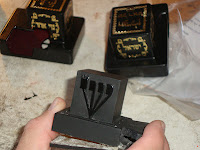Machon Shilo Notes Increase in “Ashkenazi” Kitniyot Eaters
Machon Shilo Notes Increase in “Ashkenazi” Kitniyot Eaters
Compares Mistaken Kitniyot Ban with Controversy Over Ancient Ashkelon Graves of Pagans
JERUSALEM, ISRAEL, March 24, 2010 — Machon Shilo has announced that the kitniyot rebellion continues as more Orthodox Jews are abandoning the mistaken practice of abstaining from eating kitniyot during the Passover holiday. Rabbi David Bar-Hayim, head of the institute notes with satisfaction that Machon Shilo is frequently cited as having an impact on people’s decisions.
“Each year I am contacted by an increasing number of people who inform me that they are no longer adhering to the ban on eating kitniyot,” says Rabbi Bar-Hayim. “They thank me for the “heter” of eating kitniyot and providing clear halachic insight that makes Torah Judaism relevant for thinking people.”
Rabbi Bar-Hayim uses sources in the Mishnah and Gemara to demonstrate that customs are connected to the place where one resides and are not simply packed up like household items to be relocated in a new place of residence.
“The original kitniyot ban was for the Jews of Ashkenaz, or the Rhineland,” notes the Rabbi.
“It was probably erroneous for these Jews to take this custom with them to other areas like the United States where there was no local custom, and certainly erroneous for them to bring it to the Land of Israel where the practice throughout the ages was to eat kitniyot. Eating kitniyot during the holiday is the true custom of our forefathers in the holy land. Rice was even included on the Seder plates of antiquity.”
Rabbi Bar-Hayim continues: “It’s OK that Torah sages can err. Even the Sanhedrin could err as is mentioned explicitly in the Torah. Mistakes can occur regarding kitniyot or about building emergency health facilities in Ashkelon. The halachic framework can be used as a framework for a Torah-based solution. As we recently read in the weekly Torah portion (Leviticus 4:13), errors were rectified by bringing a sacrifice to the Temple. May we soon merit to rebuild the Temple and bring sacrifices, for the Pesah offering and for the errors we’ve made along the way, whether forbidding foods that were not forbidden or preventing the construction of a hospital emergency room for the sake of ancient pagan graves that can be respectfully relocated.”
About Machon Shilo
Machon Shilo seeks to promote the study of the customs and practices of our forefathers and Rabbis, who lived in Erets Yisrael. Machon Shilo believes that while the Jewish People have physically returned to their ancestral homeland, Erets Yisrael, they have not yet returned to the Torah of Erets Yisrael. For more information visit www.machonshilo.org.
###
Media Contacts:
HaRav David Bar-Hayim, +972-54-466-7557, harav@machonshilo.org
Louis Gordon, louis@machonshilo.org



Comments
However, the minhag hamakom of the United States has always been to follow one's father's minhag in all matters.